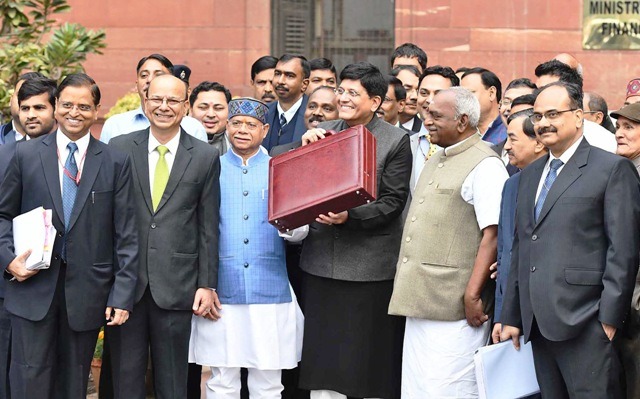Presenting the Interim Budget 2019-20, Union Finance Minister Piyush Goyal announced a plethora of proposals in the Parliament. The proposals for different sectors are likely to drive growth for the domestic building material, construction, and allied sector.
Eyeing to give “impetus” to the domestic real estate sector, Finance Minister Piyush Goyal proposed to extend the period of exemption from levy of tax on notional rent, on unsold inventories, from one year to two years, from the end of the year in which the project is completed.
In a bid to provide assured income support to the small and marginal farmers, he announced in his Interim Budget 2019 speech that the government will launch a “historic” programme – Pradhan Mantri Kisan Samman Nidhi (PM KISAN) – funded by the Government of India. Under the scheme, he elaborated, vulnerable land holding farmer families, having cultivable land up to two hectares, will be provided direct income support at the rate of Rs 6,000 per year. This income support will be transferred directly into the bank accounts of beneficiary farmers, in three equal instalments of Rs 2,000 each. The scheme, the minister added, is expected to benefit around 12 crore small and marginal farmer families.
“PM KISAN would be made effective from December 2018 and the first instalment for the period up to March 2019 would be paid during this year itself. This programme will entail an annual expenditure of Rs 75,000 crore.”
For making more homes available under affordable housing, Goyal informed that the benefit under Section 80-IBA of the Income Tax Act is being extended for one more year, ie to the housing projects approved till March 31, 2020.
The interim Finance Minister proposed that individual taxpayers with taxable annual income up to Rs 5 lakh will get a full tax rebate, and therefore will not be required to pay any income tax. “As a result, even persons having gross income up to Rs 6.50 lakh may not be required to pay any income tax if they make investments in provident funds, specified savings, insurance, etc. In fact, with additional deductions such as interest on a home loan up to Rs 2 lakh, interest on education loans, National Pension Scheme contributions, medical insurance, medical expenditure on senior citizens etc, persons having even higher income will not have to pay any tax.” This, he emphasised, will provide a tax benefit of Rs 18,500 crore to an estimated three crore middle-class taxpayers comprising self-employed, small business, small traders, salary earners, pensioners and senior citizens.
Also Read: Interim Budget – Imagining India 2030
He informed that Standard Deduction is being raised from the current Rs 40,000 to Rs 50,000 for salaried persons. “This will provide an additional tax benefit of Rs 4,700 crore to more than three crore salary earners and pensioners.” Currently, income tax on notional rent is payable if one has more than one self-occupied house.
“Considering the difficulty” of the middle class having to maintain families at two locations on account of their job, children’s education, care of parents, etc, the minister proposed to exempt levy of income tax on notional rent on a second self-occupied house. “TDS threshold on interest earned on bank or post office deposits is being raised from Rs10,000 to Rs 40,000 to benefit small depositors and nonworking spouses. The TDS threshold for deduction of tax on rent is proposed to be increased from Rs 1,80,000 to Rs 2,40,000 for providing relief to small taxpayers. The benefit of rollover of capital gains under section 54 of the Income Tax Act will be increased from investment in one residential house to two residential houses for a taxpayer having capital gains up to Rs 2 crore. This benefit can be availed once in a lifetime,” Goyal emphasised in his Interim Budget 2019 speech.
To address the trading community, Goyal said during Interim Budget 2019: “We have focussed on supporting domestic trade and services. We have assigned the subject of promotion of internal trade including retail trading. The welfare of traders and their employees to the Department of Industrial Policy and Promotion, which will be renamed as Department for Promotion of Industries and Internal Trade.”
By Mrinmoy Bhattacharjee
This article was originally published in the Jan-Feb 2019 print issue of ‘Sourcing Hardware’ magazine.

